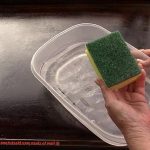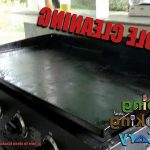Do you take pride in owning a Traeger grill? The sizzling, mouth-watering meals it produces are undoubtedly worth the investment. However, one crucial aspect of maintaining your Traeger grill often goes overlooked – cleaning and upkeep. Neglecting this can result in subpar performance and even shorten its lifespan.
So, how often should you clean your Traeger grill? The answer is not as straightforward as you might think. Factors such as usage frequency, food type, environmental conditions, and overall condition all play a role.
But fret not. We’re here to help. In this blog post, we’ll walk you through the basics of cleaning your Traeger grill. From best practices to dos and don’ts, we’ve got you covered. We’ll show you how to ensure that your grill performs well for years to come and delivers those scrumptious meals that keep you coming back for more.

So sit tight and let’s get started on keeping your Traeger grill in tip-top shape.
Contents
Frequency of Cleaning: Factors to Consider
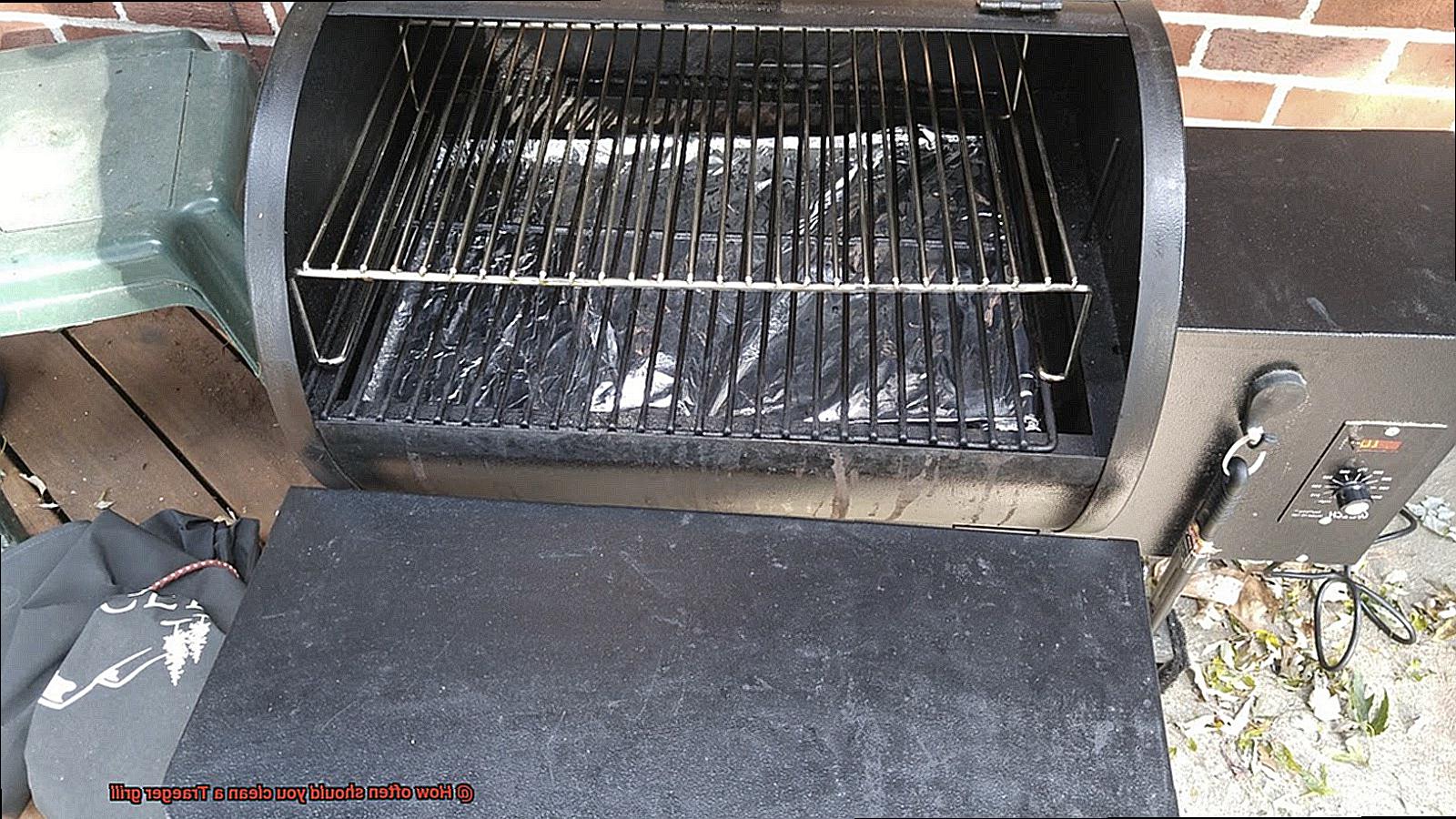
Cleaning your Traeger grill is a vital aspect of keeping it in top-notch condition and ensuring it lasts for many years to come. However, determining how often you should clean your grill can be a bit tricky. There are several factors to consider that impact the frequency of cleaning.
Firstly, the frequency of cleaning your Traeger grill depends on how often you use it. If you’re a frequent griller, several times a week, then you may need to perform a more thorough cleaning every few weeks. On the other hand, if you use it occasionally, then cleaning it after every use may suffice.
Secondly, the type of food you cook also plays a role in how often you need to clean your grill. If you’re cooking fatty meats like burgers or ribs, then grease and fat are likely to accumulate quickly on your grill grates and require more frequent cleaning. In contrast, leaner meats like chicken or fish may not require as much cleaning.
Thirdly, where you live and the climate also impacts how often you should clean your Traeger grill. If you live in an area with high humidity or heavy rainfall, your grill may require more frequent cleaning to prevent rust or corrosion.
Fourthly, the type of fuel you use can also affect how often you need to clean your Traeger grill. If you use pellets that produce a lot of ash, then regular cleaning of the ash buildup is necessary to prevent clogging and maintain proper airflow.
As a general rule, it’s advisable to clean your Traeger grill after every use to prevent buildup and ensure optimal performance. This entails removing any leftover food debris and wiping down the grates with a brush or cloth. It’s also essential to empty the ash from the fire pot and vacuum out any remaining debris.
If you frequently use your Traeger grill, performing a more thorough cleaning every few weeks is recommended. This involves taking apart the grill and cleaning each component separately. You can use warm soapy water and a sponge or cloth to clean the exterior surfaces of the grill, while the interior components can be cleaned with a wire brush or scraper.
Cleaning After Every Use
Not only does it keep your grill looking spick and span, but it also ensures that it lasts for a long time. Here’s how to go about it:

Remove any food residue left on the grates, drip tray, and other surfaces. This helps prevent any bacteria buildup and potential health hazards while also making for a more pleasant cooking experience next time. Use a grill brush or scraper to get rid of any stuck-on food particles.
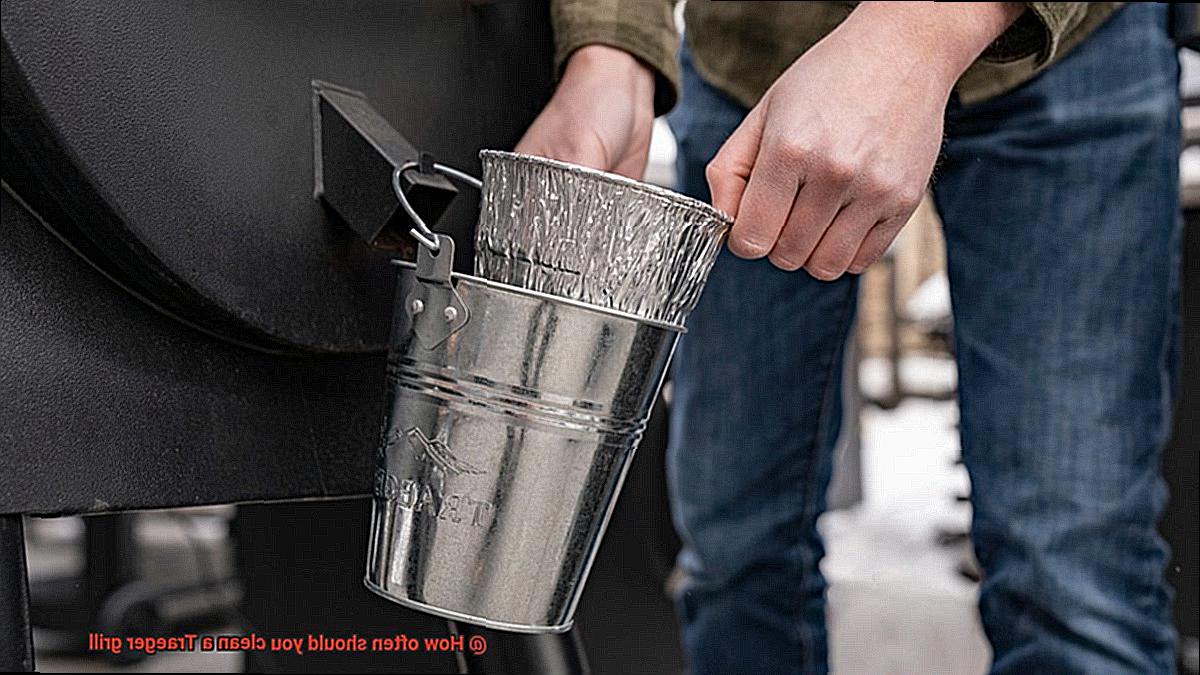
Empty the ash from the fire pot and clean it out with a vacuum or scraper. The fire pot is where the pellets are burned to create heat that cooks your food. Keeping it clean and free of debris is essential to ensure your grill works perfectly.
Clean the interior walls and racks with warm soapy water and a sponge or cloth. This step removes any grease or stains that have accumulated during use, ensuring your grill stays in top shape for future use.
Wipe down the exterior of the grill with a damp cloth and mild detergent to remove any dirt or grime that has accumulated. This step not only keeps your Traeger looking great but also prevents damage caused by prolonged exposure to dirt and debris.
Thorough Cleaning Every Few Weeks
There’s nothing quite like the taste of grilled food, but if you’re not taking the time to give your Traeger grill a thorough cleaning every few weeks, you may be putting your taste buds at risk. Not only can a buildup of grime, grease, and debris affect the flavor of your food, but it can also cause your grill to malfunction. To avoid these issues, it’s important to give your grill some TLC every four to six weeks.
To start, make sure your Traeger grill has cooled down completely before beginning the cleaning process. Then, remove the grates and drip tray and soak them in hot soapy water for at least 30 minutes. A scrub brush or grill brush can help remove any remaining debris. Rinse thoroughly with water and dry before replacing them in the grill.
Next, clean out the pellet hopper by removing any excess pellets and using a vacuum to suck out any remaining debris. If you notice any signs of mold or mildew, wipe down the inside of the hopper with a cloth dampened with white vinegar. Be sure to let it dry completely before adding new pellets.

Lastly, wipe down the inside of your Traeger grill with a damp cloth or sponge. Use a mild cleaner or degreaser for stubborn stains or deposits. Avoid using harsh chemicals that could damage the grill’s finish or leave behind harmful residue.
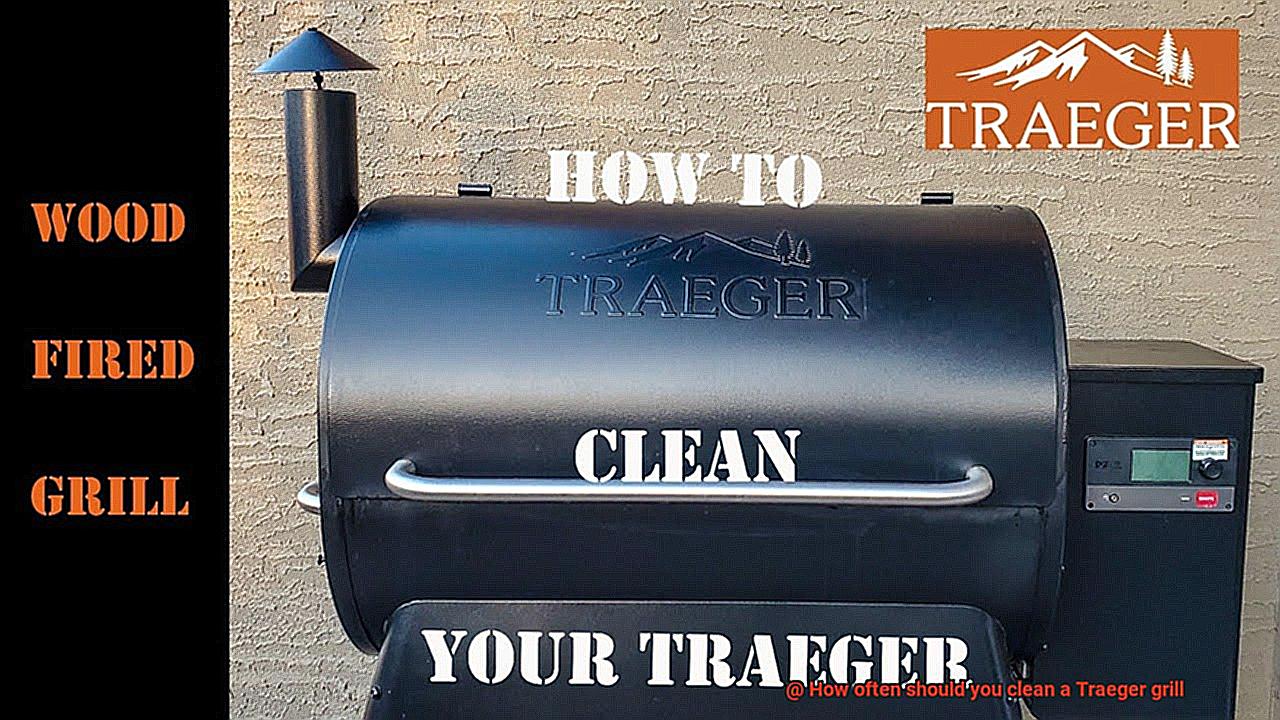
Types of Food that Require More Frequent Cleaning
When it comes to grilling on a Traeger grill, certain types of food require more frequent cleaning than others. Knowing which foods fall into this category can help you keep your grill in top condition and ensure the safety and quality of your meals. Here are 5 sub-sections that explain the types of food that require more frequent cleaning:
Meats
Meats such as chicken and fish are particularly prone to bacteria growth, making it essential to clean the grates thoroughly before and after each use. Cross-contamination can occur if bacteria from the previous use is not removed, so a deep clean is necessary for these types of food. Make sure to scrub those grates clean with a stiff-bristled brush and hot soapy water.
Fatty Foods
Burgers, steaks, sausages, and ribs are all high in fat content, which can cause grease to accumulate on the grates. This buildup not only affects the flavor of your food but can also cause flare-ups on your grill, leading to a potential fire hazard. To prevent this, it’s important to clean the grates thoroughly after each use.
Marinades and Sauces
Marinades and sauces used on chicken and fish can leave behind sticky residues that need to be cleaned regularly. Seafood, in particular, can leave a strong odor on your grill if not cleaned properly. These residues can also attract insects or rodents, so it’s important to clean your grill thoroughly after cooking with marinades or sauces.
Vegetables
While vegetables may seem like a healthier option for grilling, they still require regular cleaning. The high sugar content in vegetables such as corn and sweet potatoes can cause them to stick to the grates and burn, leaving behind charred remains that need to be scraped off. Vegetables cooked with oils or marinades can also leave behind residue that requires cleaning.
High Humidity or Heavy Rainfall
If you live in an area with high humidity or heavy rainfall, your grill may require more frequent cleaning to prevent rust or corrosion. Moisture can cause metal parts of your Traeger grill to deteriorate quickly, so it’s important to keep an eye on your grill after each use and ensure it is thoroughly dried before storing.
Humid or Rainy Weather Conditions Requiring More Frequent Maintenance
Grilling on a Traeger grill is an art form, and like any artist, you must maintain the tools of your craft. The quality of your grill can make or break the flavor of your meals, so it’s crucial to keep it in top shape. But if you live in an area with humid or rainy weather conditions, you need to take extra precautions to prevent rust and corrosion from taking hold.
Moisture can accumulate on the grill’s surfaces, leading to rust and other forms of corrosion. To counteract this, it’s recommended that you clean your Traeger grill after every use in humid or rainy weather conditions. This will help remove any moisture that may have accumulated on the surfaces and prevent rust and corrosion from taking hold.
But that’s not all; here are some additional tips to keep your Traeger grill in tip-top shape:
- Keep it covered: When not in use, keep your Traeger grill covered. This will help prevent moisture from accumulating on the surfaces, further reducing the risk of rust and corrosion.
- Regular maintenance is crucial: In humid or rainy weather conditions, regular maintenance is essential. Check your grill’s components regularly for signs of wear and tear. Lubricate any moving parts to ensure they continue to function smoothly.
- Keep it dry: Before storing your Traeger grill, make sure it is completely dry. Remove any leftover ash or debris and wipe down all surfaces with a dry cloth.
How to Perform a Regular Cleaning on Your Traeger Grill
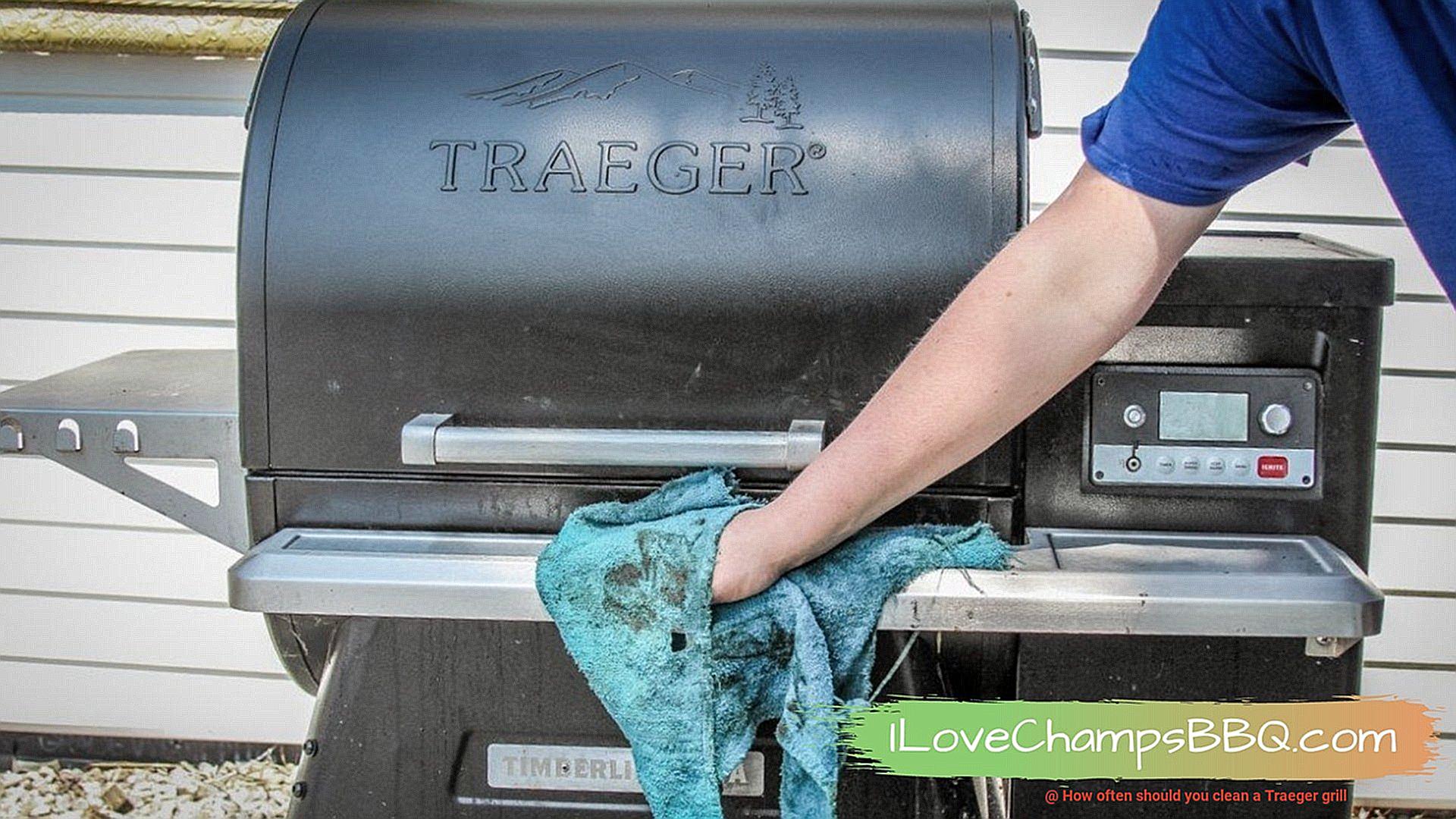
Maintaining the longevity and performance of your Traeger grill requires regular cleaning, ensuring that it continues to function correctly every time you use it. Whether you grill frequently or occasionally, cleaning your Traeger grill is an essential part of its upkeep. Here are five sub-sections to guide you through performing a regular cleaning on your Traeger grill.
Clean the Grates
The grates are an integral part of the grill that comes in contact with your food. Therefore, it’s crucial to clean them thoroughly after every use. Once the grill has cooled down, remove the grates and clean them with warm soapy water or a specialized grill cleaner. Scrub away any food particles or grease using a wire brush. Rinse the grates with water and let them air dry.
Clean the Interior
The interior of the grill accumulates ash and debris that can affect its performance. Use a vacuum cleaner or shop vac to suck out all the ash in the firepot, auger tube, hopper, heat baffle, and grease drain to prevent any grease buildup. Wipe down the inside of the grill with a damp cloth to remove any remaining debris.
Clean the Exterior
The exterior of your Traeger grill requires regular cleaning to maintain its appearance. Use warm soapy water and a soft cloth to wipe down the exterior of your Traeger grill, avoiding abrasive cleaners or steel wool that can scratch the surface. Rinse off any soap residue with water and let the grill air dry.
Check Pellets Quality
Before using your Traeger grill, ensure that your pellets are dry and free from moisture. Moisture buildup can affect their quality, causing uneven heating and affecting the taste of your food. Store them in an airtight container to prevent any moisture buildup.
Perform Deep Cleaning
For those who use their Traeger grill regularly, it’s recommended that you perform deep cleaning every few weeks. This involves taking apart the grill and cleaning each component separately with warm soapy water or a specialized cleaner. Pay close attention to the ash, grease buildup, and any other debris that may affect the performance of your grill.
Exterior Surfaces: Warm Soapy Water and Sponge/Cloth
As a grill master, you know that keeping your Traeger grill looking and functioning its best is crucial to the success of your outdoor cooking. One of the most important aspects of grill maintenance is cleaning the exterior surfaces. Not only will this keep your grill looking great, but it will also ensure that it is hygienic for cooking.
As an expert on Traeger grills, I highly recommend using warm soapy water and a sponge or cloth to clean the exterior surfaces of your grill. This simple yet effective method will help keep your grill in top-notch condition.
To get started, mix up some warm water and a mild dish soap in a bucket or spray bottle. Dip your preferred cleaning tool into the solution and gently scrub the surface of your grill. Be sure to rinse off any soap residue with clean water and dry the surface with a towel or cloth.
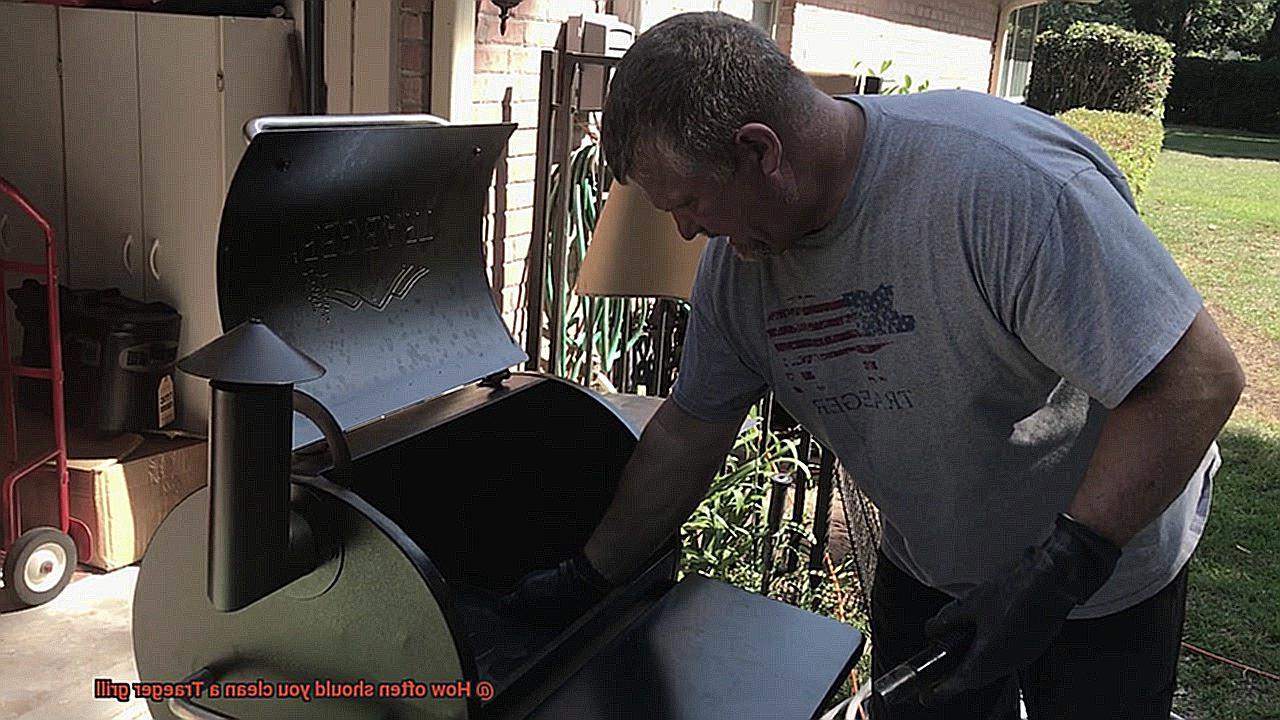
The frequency of cleaning your Traeger grill’s exterior surfaces will depend on how often you use it and the environment in which it is located. If you live in a dusty or humid area, you may need to clean your grill more frequently than someone who lives in a drier climate. Keeping an eye on your grill’s appearance and cleaning it as needed will help maintain its pristine condition.
When it comes to cleaning your Traeger grill, it is crucial to avoid using harsh chemicals or abrasive materials. These can damage the surface and potentially ruin your grill’s appearance. Additionally, be cautious when cleaning any electronic components on your grill, such as the control panel, and avoid getting them wet.
Interior Components: Wire Brush/Scraper
Regular cleaning of the grates and other interior components is key to preventing leftover food particles or grease from building up, affecting flavor, and posing a fire hazard. But how often should you clean? The answer depends on how often you use your Traeger grill and what types of food you cook. As a general rule, it’s recommended that you clean after every use.
To get started with cleaning, allow your grill to cool completely. Then, remove the grates and any other removable components like the drip tray. Get scrubbing with your wire brush or scraper, ensuring to get into all the nooks and crannies to remove any debris.
For stubborn areas of buildup, a specialized cleaner or degreaser may be necessary. Follow the manufacturer’s instructions carefully and rinse everything thoroughly before using your grill again.
It’s also a good idea to give your Traeger grill a more thorough cleaning every few months. This involves taking apart some internal components and giving them a deep clean with soap and water or another cleaning solution. Make sure everything is dry before reassembling.
3qfSrgyQ-y4″ >
Conclusion
In conclusion, owning a Traeger grill is a significant investment that requires regular maintenance and cleaning to ensure it performs well for years to come. How often you clean your Traeger grill depends on several factors such as usage frequency, food type, environmental conditions, and overall condition. It’s essential to clean your grill after every use to prevent buildup and ensure optimal performance.
Don’t forget about the importance of regularly cleaning the grates and other interior components with a wire brush or scraper. This will help prevent leftover food particles or grease from building up, affecting flavor, and posing a fire hazard. For a deeper clean every few months, take apart internal components and give them a thorough scrub with soap and water or another cleaning solution.
When it comes to the exterior surfaces of your Traeger grill, warm soapy water and a sponge or cloth are recommended. Avoid using harsh chemicals or abrasive materials that can damage the surface and potentially ruin your grill’s appearance.
If you live in an area with humid or rainy weather conditions, regular maintenance is crucial to prevent rust and corrosion from taking hold. Keep your Traeger grill covered when not in use, perform regular checks for signs of wear and tear, lubricate any moving parts, keep it dry before storing, and clean it thoroughly after every use.
By following these tips and best practices for cleaning your Traeger grill, you’ll be able to enjoy delicious grilled meals for years to come without worrying about performance issues or safety hazards.



